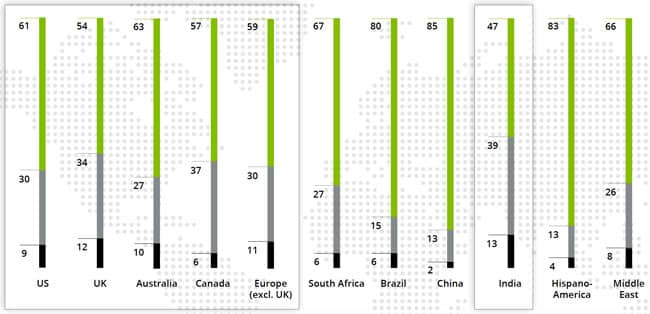Global survey reveals growing interest in shorter programmes and lifelong learning
A new Pearson survey reveals that students today are aware that there are different ways of obtaining the education/skills they need for their careers, and that many are adopting what Pearson calls a “do-it-yourself” (DIY) approach.
The online survey received responses from more than 11,000 learners in 19 countries ranging in age from 16 to 70. It represents the most comprehensive and wide-ranging global public opinion survey of learners to date. Pearson says that it shows that learners “are thinking beyond the traditional notions of learning, signaling a massive opportunity for education providers to reinvent learning to meet the needs of a new economy.”
As for what is prompting the shift in approach among learners, John Fallon, CEO of Pearson, says that “the new talent economy has arrived with its gig jobs, unconventional career paths and tech disruption.”
The 19 countries in which learners were polled were Argentina, Australia, Brazil, Canada, China, Colombia, Egypt, France, Germany, Italy, India, Mexico, Saudi Arabia, Spain, South Africa, Turkey, UAE, US, and the UK.
Some of the highlights of the survey are that:
- 68% of all those surveyed globally agree that a degree or certificate from a vocational college or trade school is more likely to result in a good job with career prospects than a university degree.
- At least three-quarters of respondents in every country surveyed believe that you have to keep learning after college to stay relevant in your career. This rose to over 90% in Australia, Canada, China, “Hispano-America” (i.e., Argentina, Colombia, and Mexico), and South Africa.
- Among respondents who once employed, had felt the need for further education, many more had opted for self-training/teaching themselves via Internet resources or taken courses provided by employers or professional associations than had undertaken upskilling from a college or university.
- Three-quarters of respondents agreed that colleges and universities focus too much on young students and need to cater more to working adults.
Marlene Olsavsky, Pearson’s managing director in Canada, says that the survey results point to significant opportunities for colleges and universities to “reinvent” education and broaden their offerings to new audiences.
“While many learners still believe in the value of formal education, they are also aware that there are different ways to go about getting the skills they need to compete for the jobs they want or to upgrade their career prospects once employed. The fact that 43% of respondents (globally) who were employed and needing to upskill found information online or self-taught is a sign that they are adopting a DIY approach and that online courses are an increasingly attractive option. Universities and colleges have a real opportunity to broaden their services to include shorter courses and upskilling programmes, and to reach students who may have already graduated but who nevertheless intend to pursue learning for the rest of their careers.”
What is the “talent economy”?
Deloitte defines the talent economy, a relatively new term, as a “collaborative, transparent, technology-enabled, rapid-cycle way of doing business … where employers and employees now seek each other out on a playing field that is broader and more level than ever before.”
The quickly changing needs of today’s developed economies means that students and professionals must adjust to new trends regularly and this is prompting growing interest in lifelong learning – and learning that is often undertaken piece by piece. These pieces may be degrees or smaller, more specialised credentials that may be more affordable and may also come from different institutions and from online platforms. The result is that students are considering a much wider range of programmes, institutions, and delivery models than they ever have, and this is the opportunity Pearson is identifying.
The Pearson study found that an understanding of the need for lifelong learning is much more established in China and India than in the US and UK, “driven in large part by the influence of technology and automation on their jobs.” These are countries where keeping up with – or better yet staying a step ahead of – technological trends is crucial to getting and keeping steady employment.
Confidence in traditional institutions slipping
The Pearson survey underlined that this is a time of disruption, with learners rethinking the kind of education that will prepare them for successful careers and also be affordable:
“Many around the world feel education somehow isn’t working for them. It’s failing their generation, not preparing them for work, is too costly, or out of reach.”
Less than six in ten respondents in the survey sample feel that the “education system in my country works well for the current generation.” Dissatisfaction is particularly high in the US, Brazil, South Africa, Hispano-America, and Europe; less than half of respondents in these regions feel their education system is working well.

Significant proportions are unsure that college is the way to a good career
More than four in ten respondents in Australia, Canada, the US, and Europe said that higher education did not prepare them for their career. This percentage rose to 51% in the UK. More than four in ten respondents in Australia, Canada, the US, and UK also agreed that “you can do okay in life today without a college degree.”
The survey revealed a feeling among many students (70% across the global sample) that “colleges and universities care more about their reputation than educating students.”
Respondents with post-secondary credentials were asked which educational path they would take if they were given the choice today: college, vocational education (or just go straight into the workforce after secondary school, an option that garnered little enthusiasm across surveyed countries). Opinion was very mixed; for example, 80% of Brazilians said they would choose to go to college, while only 47% of Indians agreed. At least three in ten respondents said they would opt for vocational training in the US (30%), Canada (37%), UK (34%), other European countries surveyed (30%), and especially India (39%). In contrast, Brazilians (15%) and Chinese (13%) are much less attracted to the idea of vocational training as an alternative to traditional college.

Staying human will be ever more a competitive advantage
As much as STEM skills are in demand today, more than three-quarters said they felt the need to work on their “soft” skills like creative thinking, problem solving and collaboration – about as many as said they should improve their STEM skills. Most respondents also think that soft skills will be even more important in the future, and high proportions across the survey felt that colleges needed to be doing more to help students develop these.
Affordability is a concern
More than six in ten in Australia, Canada, and the US feel that education is getting more out of reach for the average person, and more than half feel the same way in Europe and South Africa. At the other end of the spectrum, only 21% of Chinese consider education to be getting more unattainable.
Upskilling will be necessary, and short programmes are the most popular choices
There is strong agreement across the global sample that there will be a need for continual upskilling as people get older.
As for which way they could imagine upskilling, the largest proportions said they would do it through “a short training programme such as a boot-camp, certificate programme, or something offered by a professional association.” These proportions were at least twice as large as those of respondents who said they would upskill through an accredited university or college training programme in several regions: the US, Australia, Canada, Europe, Brazil, China, and the Middle East.
Another important finding was the large proportions across the global sample who said they would use a free resource such as YouTube, Lynda.com, or Khan Academy: more than a quarter said this would be their preferred option in the US, UK, Australia, Canada, South Africa, Brazil, China, and India.
Conclusion
The Pearson survey shows that today’s learners are (1) increasingly adopting a DIY approach to education, (2) more aware of the value of vocational and short training programmes, and (3) turning to the Internet for quick upskilling sessions. Now is the time for colleges and universities to evaluate their programme models and partnerships to:
- Make more room for short courses aimed at older/employed students;
- Ensure that they are offering online courses of varying lengths and price points to reach larger, more diverse, and international audiences;
- Offer opportunities for students to layer different kinds of credential (e.g., a degree, a diploma or certificate, and/or a micro-credential obtained online);
- Potentially partner with employers to offer targeted skills training;
- Increase the extent to which they help students acquire the soft skills they feel they need to succeed.
For additional background, please see:
- “Africa’s pressing need for targeted skills training”
- “Survey shows study abroad decision process is changing with more factors at play”
- “Further evidence that international students are increasingly prioritising employment outcomes”
- “The growing importance of non-degree credentials”














